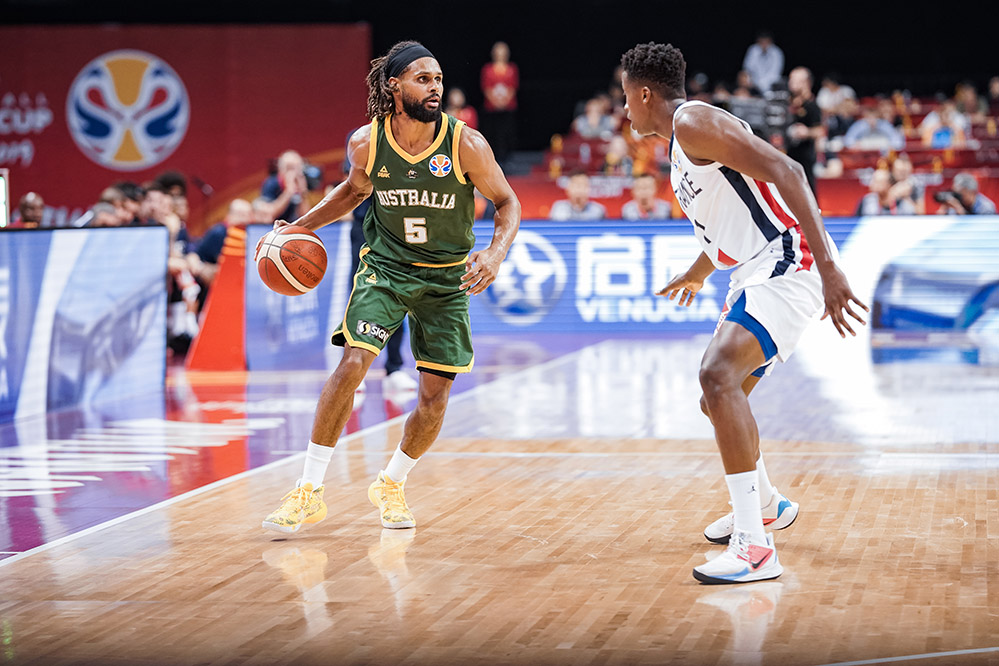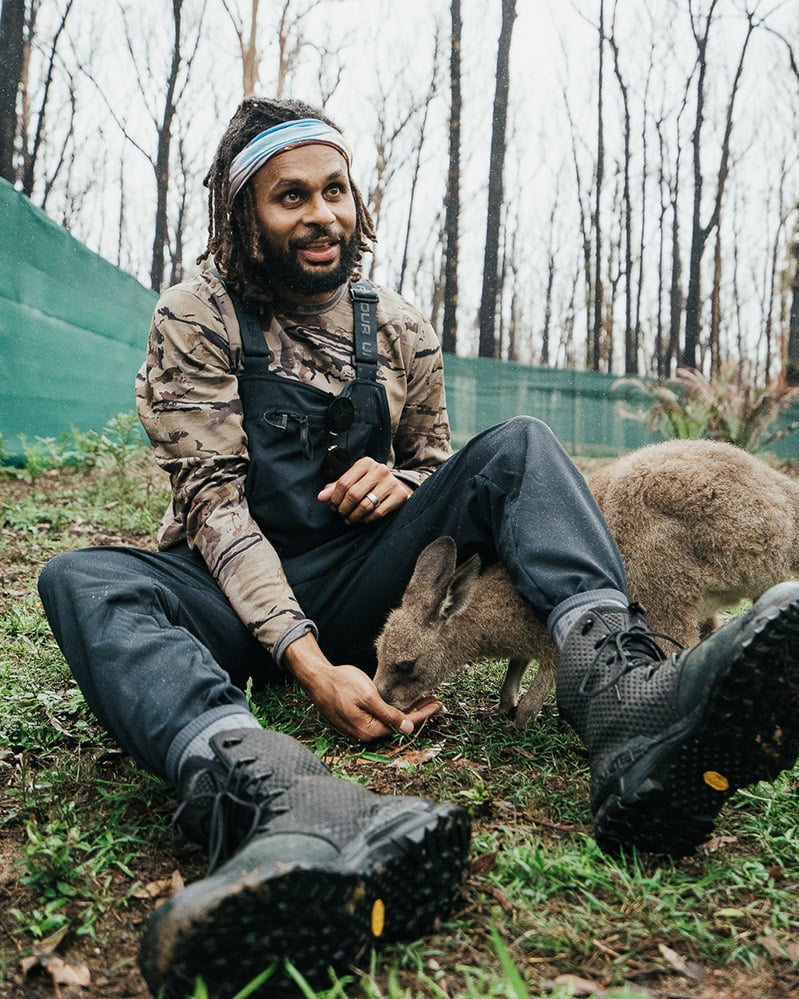Matthew Adekponya*
NBA great Patty Mills is quietly doing great things for his homeland. Rolling Stone Australia caught up with the pro baller for an iso-insight into his passion for the green and gold, and love for his island home.
Sometime in 2019, between the Australian Boomers’ improbable win against Team USA in a “friendly” game in Melbourne, and the national team’s deep run in the basketball World Cup, the call went up for new leadership. Patty Mills for PM. It was only a half-joke.
With every outrageous jump shot, every drive and finish in traffic, every dagger Mills delivered, social media lit up. Running the country isn’t in his plans, but many would wager he’d run the show better than the current leadership.
Mills is the ultimate Australian. Undersized, never beaten, much loved, but sadly unknown to Aussies outside of basketball. A proud Indigenous man, he’s faced adversity, injuries, and come back stronger. Off the hardwood, he’s closely involved in several projects helping remote and Indigenous communities in his homeland, sometimes taking full use of a one-week gap in his schedule to fly home and get to work.
Mills is a champion of his sport, an athlete at the very peak of the Everest that is the NBA. Listed at just 183cm or 6ft, Mills often gives away 10cm or more in height to his matchup. He makes up for it in speed and tenacity. At the other end, he’s the kind of guy who can take the game away from the opposition. He loves to score. When he’s on a roll, he’s deadly.
In a late season game in 2012 against a depleted Golden State Warriors, Mills went wild for 34 points and 12 assists; his scoring output an NBA record for an Australian for several years, until Ben Simmons and Aron Baynes eclipsed it.
Pro sports love a nickname. Air, Magic, The Refrigerator, The Microwave, Mr Big Shot. Patty “Thrills” is one that sticks.
In 2014, Mills delivered the knockout blow against LeBron James’ Miami Heat to win his first NBA title. His 17 points in that game is part of San Antonio Spurs folklore, and it sent Mills into the books as the first Indigenous Australian to win an NBA championship (he’s not the first Indigenous Aussie NBA player. That honour goes to his cousin Nate Jawai, who now plies his trade in the domestic NBL). After the win Mills flew three flags for the world’s media; those of Australia, the Aboriginal people, and the Torres Strait Islanders.
Now in his eleventh season in the league, Mills, 31, is scoring at a career-best 11.7 points per game. “The best is yet to come, mate,” he warns. “My peak is coming.”
“The best is yet to come, mate. My peak is coming.”
Speaking to Rolling Stone Australia from his home in San Antonio, Texas – his home for the best part of a decade – Mills is still scoring, even though the season is on hold.
“We’ve made the most out of this quarantine,” he explains. “Obviously, it’s affected a lot of people. But we’ve adjusted and found ways to keep busy. We’ve been very proactive.”
When the 2020 season returns, “we’ll be ready,” Mills insists. Following the interview, the NBA restarted the league on July 31 in an abbreviated format with games played in an isolation zone “bubble” in Orlando, Florida. Mills was ready. In his first game back, on August 3, Mills scored 10 points in 13 minutes in a 108-106 win against the Memphis Grizzlies.

Patty Mills quickly became one of the most impressive players in the NBA. (Photograph by Matthew Adekponya)
The point guard is always ready for the call. His journey through the NBA has taught him to prepare, to stay patient, and to make an impact, whatever the circumstances. In January 2009, as he neared the end of a stellar journey at Saint Mary’s College of California, Mills broke his hand. His stock fell and his number came up at 55 in the NBA Draft, a worst-case scenario leaving the youngster with no real job security. During training camp with the Portland Trailblazers, Mills broke his right foot.
“That was one of the tough periods in my basketball career,” he tells Rolling Stone Australia. “I had two major injuries and surgeries over a span of about five or six months. A while back I counted how many games I played that year and I counted them on one hand. It wasn’t a great year from a performance standpoint but, mate, it really shaped my mindset. I’m obviously a really competitive person but I came out of that with something to prove.
“[That year] taught me another level of strength, and dealing with adversity. I’ve been dealing with a lot of adversity throughout my whole life, not only on the basketball court but a lot off of it. That was just another example.”
Patty has heard it all before. He’s shrugged off racist taunts in his youth, and faced them in his adopted home, the United States. In an incident during a road trip in 2018, a Cleveland Cavs fan racially abused the Australian. “Hey, Jamaican dog, they want their bobsledder back,” the man called out. And then, “Hey Mills, Jamaica just called, they want their bobsledder back.” The ugly comments were caught by mics, and the Cavs organisation handed the spectator a lengthy ban. Mills responded with grace. “I am a proud Islander,” he tweeted. “Like my Jamaican Brothers, me and my family in the islands of the Torres Strait have experienced racial slurs for decades. Hope your efforts will enlighten this confused, hateful fan.”
Thanks @thats_Z_Truth. I am a proud Islander. Like my Jamaican Brothers, me & my family in the islands of the Torres Strait have experienced racial slurs for decades. Hope your efforts will enlighten this confused, hateful fan. #BlackHistoryMonth https://t.co/yH3nKlGv4A
— Patrick Mills (@Patty_Mills) February 26, 2018
After two unremarkable seasons in Portland, Mills headed to the Lone Star State and the storied Spurs, a team led by the “Big Fundamental” Tim Duncan and “The Admiral” David Robinson before him, and organised by Gregg Popovich, a former military man who just might be the greatest coach in sport.
Mills thrived in Coach Pop’s system as a reliable “spark” off the bench, and as a reserve to the retired great Tony Parker. A piece in a high-performance basketball machine built with international parts, sourced from the US, France, Italy, Argentina, Brazil, Australia, and elsewhere. Every day with Pop is an education.
“Before practice starts, he’ll always ask us a question about current world news or any question that broadens our mindset. Do you know what’s going on in the Amazon forest or Italy? He understands that we’re in a bubble here in the NBA. He genuinely cares about the players.”
In a corner of the Spurs’ locker room sits a framed quotation from the social reformer Jacob Riis. “When nothing seems to help,” it reads, “I go back and look at the stonecutter hammering away at his rock perhaps a hundred times without as much as a crack showing in it.”
It’s a testament to hard work and persistence. Pop asked Mills to have that quote translated into his own language, Meriam Mir, spoken on Murray Island in the Torres Strait. “That happened in the first month of me being here,” Mills recounts. “It was special of him to ask me to do that. Of course, he’s done it for any international player that has come in. Leadership is probably the thing he does best.”
Coach and Mills led the team for a history lesson about the Australian’s homeland on June 3rd, 2015 — Mabo Day — with Sports Illustrated remarking at the time that Pop’s remarks were “a tour de force.” Mabo is Mills’ great-uncle. On January 19th of this year, the Spurs’ arena the AT&T Center hosted the franchise’s first Indigenous Night, initiated by Mills.
“When I get to put on the green and gold I’m a different beast, I love the opportunity to play for Australia.”
Mills lists Steve Renouf, Andrew McLeod, and Cathy Freeman among his childhood heroes (“that’s one hell of an idol there,” he says of Freeman). And of course his father Benny, a Torres Strait Islander (Muralag) and his mother, Yvonne (Ynunga), a victim of the Stolen Generations, from who he “learnt all my values.” Mills’ dad taught him to play guitar and he owns three Matons; “made out of Queensland wood, stuff that allows me to stay connected with my country.”
Clearly, Mills is deeply bonded with his homeland. The unprecedented bushfire season was particularly painful to observe from afar. “I felt my identity going up in flames at the same time,” he recalls. Mills and his wife Alyssa turned to social media to bring attention on the situation after the mainstream media had turned to other news. Rather than put his feet up during February’s All-Star break, the pair returned home and visited bushfire-affected communities and delivered much needed supplies. During the trip, they built an animal shelter and hiked to Wallaga Lake in NSW to build solar-powered “hydropanels,” to provide clean drinking water for a small Aboriginal community. Mills also met with Indigenous fire practitioners. There’s more to learn, and Mills is happy to lead.
“To say the fires will be back again, just isn’t the right attitude. We need to take preventative action,” he says. “There is knowledge out there if people are willing to learn and listen. It’s a very special place, Australia. I want to do everything I can to make sure we look after our country as well as we can.”

Earlier this year Patty Mills donated money and time to communities devastated by bushfires in New South Wales. (Photograph by Luke Currie-Richardson)
Earlier, in 2019, Mills teamed up with Zero Mass Water (the company behind those SOURCE hydropanels) for the Community Water Project, to create clean, sustainable drinking water for remote Indigenous communities.
“This one is a special one for me,” Mills says. “The feedback that we’ve got from that project has been absolutely enormous and the smiles on the faces, you wouldn’t think a glass of water would do that to people. It’s been really heartwarming. This is only the start, we’ve done a little bit of work. My hope is that all the communities throughout Australia that don’t have access to clean drinking water on a regular basis are able to get hold of this. It is a real issue in Australia,” he says, before adding, “that’s my platform again, just to shed some light on it.”
Mills brought light to several issues during lockdown. In separate announcements following his RS interview, the star guard pledged his NBA restart salary (over $1 million USD) to the Australian Black Lives Matter and launched Indigenous Basketball Australia, an initiative focused on creating pathways into the sport for Aboriginal and Torres Strait Islanders. IBA programs will kick off next year.
There are also “special” goals on the court. A medal at the Olympics is top of the list. “When I get to put on the green and gold I’m a different beast, I love the opportunity to play for Australia,” he admits. If and when the Tokyo Olympics go ahead in 2021, there’s one thing on Mills’ mind. To win a gold medal, and erase the stain of the bronze medal game in Rio 2016, which saw Mills pinged with a phantom foul as time expired, giving Spain a pair of free-throws and the medal.
“That’s fuel for the fire, mate. It has been since then,” he says of the tournament. “I’ll make sure that we’re ready to roll when Tokyo comes around. Don’t worry about that.”







































